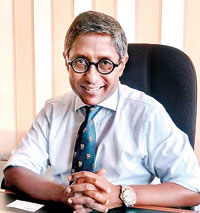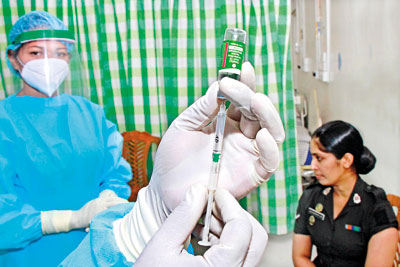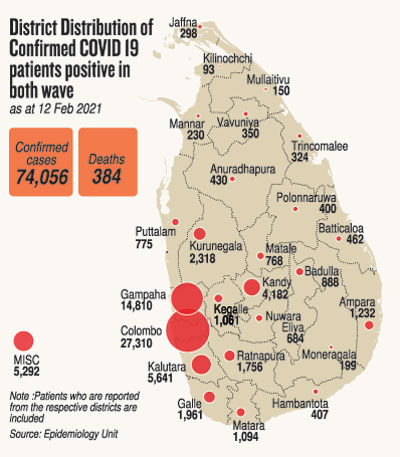News
Vaccines through COVAX due this month
Sri Lanka is expecting to get the first stock of vaccines from the global vaccine initiative – COVAX – by the third week of February. Earlier, the country was expecting vaccines for 20% of its people, all for free, from COVAX, but the quantum may go up to nearly 27% to 30%, the Sunday Times learns.
The percentage of how many doses is not known yet but “we feel that anything between 0.5 to 1 million doses” will be received by the third week of February, the Chairman of the National Medicines Regulatory Authority (NMRA), Professor Asita de Silva, told the Sunday Times after participating in a midnight virtual call, along with Chief Epidemiologist Dr. Sudath Samaraweera, on Thursday, with key international decision-makers of COVID-19 related work including vaccination.

Prof Asita de Silva
“Initially, they (COVAX) were planning to give 20% of our population’s vaccines but now they may be in a position to give 27% to 30%. It will be free and the rollout will begin,” said Prof. de Silva.
Pointing out that COVAX is also hoping to secure Pfizer vaccine stocks as well, he said that these international decision-makers had indicated that they would be granting emergency-use listing (EUL) to the AstraZeneca vaccine tomorrow (February 15). Soon thereafter, the rollout of the AstraZeneca vaccine through COVAX will begin.
Thursday’s call had been with the Director-General of the World Health Organization (WHO), Dr. Tedros Adhanom Ghebreyesus; WHO’s Chief Scientist Dr. Soumya Swaminathan; the Chief Executive Officer (CEO) of the Coalition for Epidemic Preparedness Innovations (CEPI), Richard Hatchett; the CEO of GAVI (the Vaccine Alliance), Seth Berkley; and senior officials from the World Bank, the Global Fund and the United Kingdom’s Wellcome Trust.
COVAX (COVID-19 Vaccine Global Access) works with vaccine manufacturers to provide countries worldwide equitable access to safe and effective vaccines once they are approved and licensed. It is co-led by GAVI, CEPI and the WHO.
Elaborating on the discussion, Prof. de Silva said that “they wanted to review Sri Lanka’s regulatory framework, how we provide regulatory approval for emergency use of vaccines, deployment, prioritization and rollout plan. We gave the required briefing including legislation and that we are already rolling out 500,000 doses of COVISHIELD (donated by India)”.
“The feedback was that they were very happy with what we have already planned and also our preparedness to accept and deploy efficiently even the vaccines which need ultra-cold conditions, which we are in a position to deploy via blood banks, etc.,” he said, explaining that they indicated that next week, a Korean manufacturing plant and Serum Institute in India (which are manufacturing COVISHIED) will get EUL by the WHO.

Vaccination rollout uderway at the Panagoda Army Hospital. Pic by Indika Handuwala
In order for a vaccine to be supplied through COVAX, it must be evaluated and approved by the WHO. So far, the WHO has granted EUL only for the Pfizer vaccine (BNT162b2). The vaccine developed by Oxford University and AstraZeneca is being produced as AZD1222 (ChAdOx1 nCoV-19) in the UK, while it is manufactured as COVISHIED at the Serum Institute, India, which has been granted a licence by AstraZeneca.
Prof. de Silva said that to Sri Lanka’s request that we would like to have a large quantity, not just in lakhs but as 0.5 or 1 million doses at a time, they had said they would give it due consideration.
Evidence about AstraZeneca vaccine & variants
With regard to the AstraZeneca vaccine, Prof. de Silva said that these key players in the pandemic were “very clear” that the current evidence shows that the AstraZeneca vaccine (two doses) should ideally be given 12 weeks apart to get the best value of the vaccine. This, we (Sri Lanka) have to decide internally and the Epidemiology Unit will do so in consultation with other experts.
He added: “We also discussed the variants. Regarding the South African variant, they said that studies were inconclusive so they are looking into it. However, so far, the green light is on for AstraZeneca to be distributed in South Africa. The experts said that the virus will mutate under biological pressure. It will happen internally and most of these vaccines will take care of them.
“They feel that there may be a requirement further down the line for another booster vaccine in another 6 months for extra cover and to cover variants.
“Their message was very clear, to vaccinate as many as possible as quickly as possible, firstly to break transmission. Vaccination must be strengthened further by preventive measures such as mask wearing, social distancing and avoiding mass gatherings. The vaccine is effective and it is coming but even when given, there needs to be clear communication to the public to protect themselves”.
Meanwhile, the virtual meeting had also been told that the Chinese vaccines, Sinovac and Sinopharm, are also under evaluation by the WHO for EUL. They had submitted their dossiers to the WHO some time ago and a decision might be given some time, earliest in March.
The Russian vaccine, Sputnik V, is also being evaluated. That is a lot of vaccines under their portfolio, said Prof. de Silva, adding that “we can rapidly acquire them and register them”.



